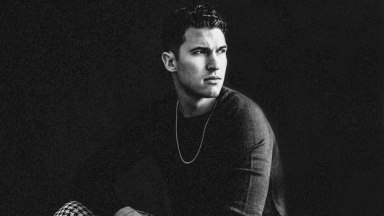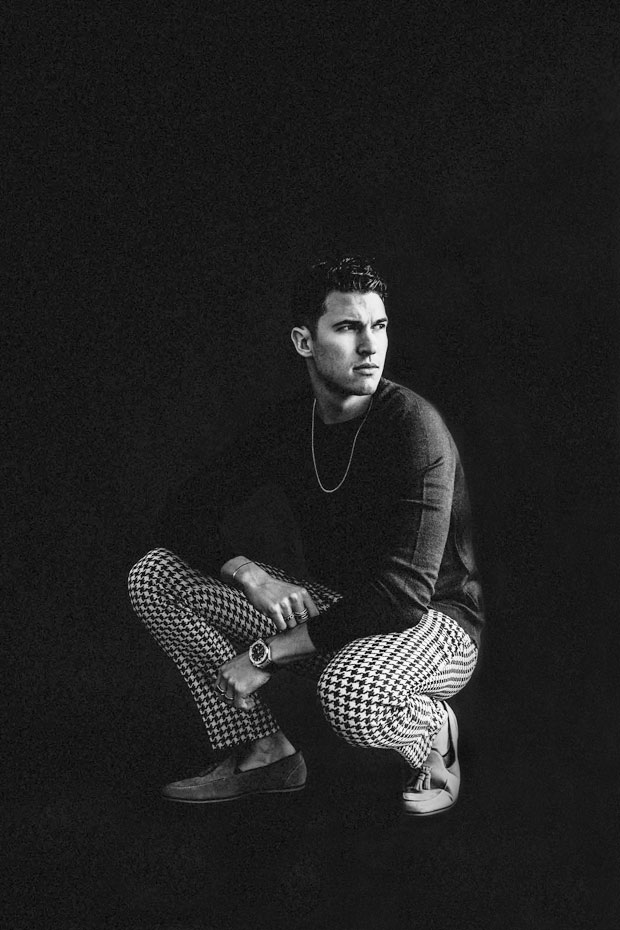
“I think Southern California doesn’t love me no more,” sings CAL on “So Cal,” the closer on The Identity Crisis: Side A. This blunt observation, from an East Coast native taking stock of where his life has taken him, is a powerful lyric, one exemplarily of the honesty found on his debut release. Some of the lines on The Identity Crisis catch you upside the head like a sobering slap. The chorus on “Better by Now” (“I’m sure you left me with my pieces put together / I was supposed to be better / I was supposed to be better by now”) details CAL’s struggles with losing his father at a young age, but they can easily apply to anyone who has yet to figure out their life.
Therein lies the best part of The Identity Crisis. Though CAL – better known one half of the successful dance-pop duo Timeflies – has written his most personal and intimate music yet, the tracks on this debut have reached a grand universal appeal. Anyone who has ever seen a friendship crumble will connect with “Friend,” the same way that anyone who has genuinely know the intoxicating kiss of love will vibe to “AFU.” The Identity Crisis sees CAL take his songwriting to an exciting new level.
It also doesn’t hurt that the EP is groovy AF, even when CAL is singing about some of the most heartbreaking parts of his life. Such contradictions – a joyous beat with lyrics mourning the damage caused by a parent’s death – make The Identity Crisis: Side A such an intriguing release, one that continues to reward the listener with each repeat listen. CAL, while speaking with HollywoodLife, elaborated on what motivated him to put himself in this project, how his marriage to Hope Driskill has affected his songwriting process, and why he thinks this project is a “huge step forward” for his musical career.
HollywoodLife: Do you still think that Southern California doesn’t love you anymore?
Cal Shapiro: Look, I have love for Southern California, and I love it here, and there are definitely… I think everyone comes out here with these bright eyes thinking like, “This is mine,” and it quickly snaps you in your place. Not that New York City doesn’t.
But yeah, I think I came out here at a time where I felt like, “I’m about to run this thing,” and then you realize that literally all of entertainment happens here, slow your roll. And you realize that… and that’s one of the things I miss about New York, the relationships just aren’t as real. They’re more like, “What can you do for me?”
And I mentioned that where I say, “I feel like I don’t have couches to crash on in New York.” It was like those were the people who if you needed anything they would be here. Here it’s like, “Do you have a part for me? Will you write with me? Okay, yeah, I’ll be there.” It’s very much transactional in that way.
Would you say then that you’re in an unhealthy relationship with Southern California?
Yeah. Yes, I would say that.
This new project is your most personal music yet. Why did you feel that you couldn’t put so much of yourself in your music with Timeflies?
I felt like I wanted to express and tell who exactly I was, and it’s — especially in a social media age — incredibly challenging to do that as a band. You know from one standpoint whether you’re tweeting or Instagramming, it’s like, ‘wait, who’s saying this? Who is the voice?’ And I think that’s one of the things that I’ve been trying to establish with my project, is I want you to feel my voice in my writing. I want you to know me. And in Timeflies, you didn’t know. You didn’t even know who was saying that specific thing.
Granted, we wrote all the songs together, and there are definitely personal songs that I wrote with Timeflies, but it was always like, “Well, Rob [Resnick], would you feel comfortable saying this?” We’d kind of tailor it from there so that it could come from both of us. But this is fully unfiltered me.
Did you have to take on a different tone and energy for this project? These new tracks have a different vibe to them, a little more intimate, whereas Timeflies’ songs were big enough that they’d hit the people in the back row.
Yes. With establishing the voice on The Identity Crisis, I wanted to have a certain intimacy. And one of the things I focused on over the last like a year and a half is getting really good at vocal production. So, I’ve been producing all the vocals myself for this project to have this almost quieter [sound], like you said, more intimate. It’s like you’re in the room listening to me. Especially “So Cal,” a song like that, it sounds like I’m just telling you exactly what’s going on as opposed to like singing it at you.
I do love [Timeflies’] style, and it’s not like I don’t want to do that again. But, Timeflies’ signature sound was these big dance records – which, I still put on, and they still play, and I still go to a SoulCycle and hear them, and it’s awesome. But, I’m trying to be calculated and take my fans on a journey. Side A, the first part of the project, is like, “Okay, here’s me. Here I am. This is CAL”.
It’s not like I’ll never make those songs again. It’s just more I want to kind of take a step back to take a giant step forward.

You gave fans a preview of this new project by sharing a few songs ahead of the EP’s release. Did you get any feedback on the new sound? “Oh my god, this is so different”?
I haven’t gotten so much, “Oh my God, this is so different.” It’s been overwhelmingly positive. I expected a lot of like, “Where’s the dance? Where’s the drop?” And that’s a major part of why I wanted to call this The Identity Crisis. I’ve struggled with that a lot in my career where it’s like, with the Timeflies Tuesdays, which we’re rapping, which got popular before even the original music did, everyone, when they heard the original music, was like, “I want you to rap.” And then when I rapped, they were like, “I like when you sing,” and it’s always like, “Well shoot, what do I want to do?”
It’s hard to say, in this day and age, that you’re not influenced by what the fans are saying or the comments, but that’s what I want to explore here. And the fans have just been really overwhelmingly positive.
Has making The Identity Crisis made you more comfortable in your own skin?
100%. I think it’s therapeutic, and I wanted to think of the Crisis as like – I’m a very positive person, even though it sounds in some of these I’m being negative, and I think the “identity crisis” is natural. I think I wanted to explore the idea that we all kind of have it.
Like if you go to college, you’re with all your friends, and then you’re just dropped on your, you know, out in the cold and you’re like, “Wait, what do I do now? I’m in debt, I have all this”, and it’s like, “Who am I? What do I want to be?”
I think everyone struggles with this. And “identity crisis” is a phrase that has such a negative connotation, but I think it speaks more to a journey of finding yourself. Like this is positive that you’re at least analyzing and trying to understand.
The Identity Crisis addresses a lot of personal issues, including dealing with losing your father at a young age. Did working on this project bring any closure or resolution to these issues?
It did, and it also created [some issues.] The song “Friend” is about my best friend from college, and I’m kind of dreading him hearing it. I went through a lot of like, “Why am I putting this out?”, and all my songwriting peers and everyone I’ve played it for was very much like, “Oh my God, I have this friend and this is… you have to put this out”. And it’s not just for me, it feels like a lot of people share this thing where someone just kind of disappears on you, or does some shady shit, and so I wanted to speak to that. And it was therapeutic. It made me realize things, like we got to talk it out. Except sing it out on a record.
One of the wonderful contradictions of music is that you can make your most personal record, and it suddenly has a universal appeal.
Yeah. Until I said it somewhere, that I assumed everyone thinks with “Better By Now” would be about a relationship or heartbreak, you know? And I wanted to make a lot of those lyrics like it could mean whatever you wanted it to like you are going to adopt it to your life. But yeah, for me, listening to those from the context of what we just talked about, it is definitely heavier.
It’s been a year since you and Ms. Hope Driskill tied the know. Did marriage affect the songwriting on this project?
That just made me more in my own skin. The Identity Crisis, as much as it is now, is like reflecting on the past couple of years. And when I was with Island, and I was in a very serious relationship, they were very much like, “Yeah, I don’t know that you should advertise this.” And since then, people have been more open about posting stuff, but that is very much a thing where people will tell you not to talk about your relationship and that kind of contributed to like why? Why shouldn’t this be a thing?
I love love. Love is awesome. And I think getting married kind of made me more secure, more comfortable in that like, “Yeah, I love this, I love you, I’m thrilled about our life, so f-ck it, why can’t I shout it from a mountaintop?”
What does she think of the new music?
She loves it. She’s my biggest fan. Actually, she’s a pretty tough critic, and I play a lot of the stuff for her.
Are you headed out on tour with this new music?
I’m looking at doing something in the spring, that is kind of in the works. And then, right now I’m just focusing on getting the live show ready, and it’s a blank canvas on how I want to do that. So just been getting good at like playing the stuff live, hopefully with live drums and all that. And it’s just fun right now. It feels like I can just kind of do whatever I want. It’s very freeing.
—
The Identity Crisis is out now.


